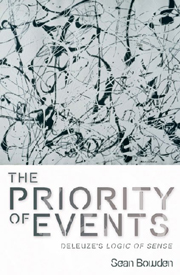Book contents
- Frontmatter
- Contents
- Acknowledgments
- Abbreviations
- Introduction: The Ontological Priority of Events in The Logic of Sense
- 1 The Stoics – Events and Sense
- 2 Leibniz – The Static Ontological and Logical Geneses
- 3 Lautman and Simondon – Problematic Ideas and Singularities
- 4 Structuralism – Structure and the Sense-Event
- 5 Psychoanalysis – Dynamic Genesis
- Conclusion
- Bibliography
- Index
5 - Psychoanalysis – Dynamic Genesis
Published online by Cambridge University Press: 12 September 2012
- Frontmatter
- Contents
- Acknowledgments
- Abbreviations
- Introduction: The Ontological Priority of Events in The Logic of Sense
- 1 The Stoics – Events and Sense
- 2 Leibniz – The Static Ontological and Logical Geneses
- 3 Lautman and Simondon – Problematic Ideas and Singularities
- 4 Structuralism – Structure and the Sense-Event
- 5 Psychoanalysis – Dynamic Genesis
- Conclusion
- Bibliography
- Index
Summary
Deleuze's relation to psychoanalysis in The Logic of Sense is ultimately governed by the following problem: how can the surface (that is to say, the metaphysical surface, transcendental field, problem or structure of sense), with its constitutive series of things and propositions, be understood as an event which is itself determined on the surface? In other words, if the above-analyzed structure of sense is supposed to account for the progressive evental-determination of events in general, and if events have ontological priority over fixed things ‘all the way down’, then Deleuze must show that the structure of sense is not an already given condition like the Kantian transcendental, but rather an event which is immanent to itself. As will be seen in this chapter, Deleuze turns to psychoanalysis because it is capable, through its concepts of infantile sexuality, the phallus, castration and the phantasm, of thinking the genesis of structure in a structural way. Put in psychoanalytic terms, the ‘genesis of structure’ is thought by means of a structural account of the entry of the real, biological child into what Lacan calls the ‘symbolic order’, comprising all of the linguistic and cultural structures governing human existence. In other words, psychoanalysis develops a structural account of the ‘event’ of the symbolic order for the child, the ‘symbolic’ being, for Deleuze, another name for the metaphysical surface, problem or structure of sense, such as these have been analyzed throughout the preceding chapters in their linguistic and intersubjective aspects.
- Type
- Chapter
- Information
- The Priority of EventsDeleuze's Logic of Sense, pp. 185 - 261Publisher: Edinburgh University PressPrint publication year: 2011



